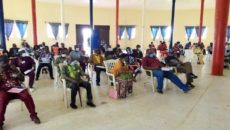BUCHANAN, Grand Bassa – A group of Grand Bassa residents are accusing the Equatorial Palm Oil Company of reneging on its responsibilities as enshrined in its concession agreement with the government.
The group, calling themselves the Aggrieved Citizens United for Transformation of Kpogbarn Statutory District, gathered in large numbers outside the company’s head office in Grand Bassa’s fifth district to present their petition to Rep. Thomas Goshua. They alleged that the Liberian subsidiary of EPO has failed to provide some of its social responsibilities specified in the concession agreement.
The protestors are giving the company two weeks to address their concerns, although they did not specify what actions they would take if their concerns are not dealt with.
“We the aggrieved citizens of this noble district do assemble here to express our disenchantments and frustrations over the manner and form in which we have been treated by the management of LIBINC Oil Palm Company and her associate Equatorial Palm Oil group of companies,” Lyon McCrity read the petition on behalf of the group.

Lyon McCrity reads the petition on behalf of the aggrieved citizens. Photo: Elton Tiah
The petition noted that the company had agreed to construct 50 latrines in the concession area within two years, but it has not done so. It also mentioned that the concession agreement called “for the establishment of an adult literacy program for Liberians, by providing an annual amount of US$25,000 during the rehabilitation period and such amount should be increased to US$50,000 during the regular period.”
Since 2013, the petitioners say the company owes US$150,000 of this amount.
They also mentioned that the company failed to fulfill its duty to ensure that Liberians should occupy 50 percent of the top 10 positions in the company during the rehabilitation term and 75 percent during the regular term. They noted that the agreement also requires the company to train Liberians to occupy these positions, although EPO has not done so, and instead opted to provide those jobs to foreigners.
“Section 7.3 speaks to safe drinking water,” McCrity continued, adding that the company was required to “ensure that all employees’ residential communities within the concession areas are being supplied, on a regular basis, with safe drinking water.”
This required EPO to construct wells with hand pumps in each of its plantation subdivisions, “but the management has failed to comply,” McCrity added.
He noted that the company also failed to ensure proper housing for its employees, as required by the concession agreement. On the contrary, he noted, “80 percent of the employees that are citizens live outside the plantation, whereas camps like Yeaway and Neor have deplorable housing units, and we demand the quick renovation of those units so as to enable citizens who are employees to move to into those buildings.”
McCrity also said the company had not done enough to work with local palm farmers to teach them proper farm management techniques and transfer technologies to them, as required in the agreement. Moreover, the company was required to contribute to the value of one percent of its annual sales to a community development fund.
However, McCrity said the company had already started exporting without remitting a percentage of its sales. He called this “a breach in this section of the agreement.”
A section of the concession agreement also called for EPO to establish a junior or senior secondary high school to cater to the education needs of the employees’ dependents, but the petitioners said this has not happened.
McCrity said it was important to “draw the attention of management to some of these ills that have been meted against our people.” He called on them to make the necessary corrective measures to avoid future inconveniences.
Rep. Goshua, who received the petition, promised to ensure that the company complied with its concession agreement. He commended the petitioners for being peaceful, despite the serious grievances they had.
Goshua promised to get back to the citizens within two weeks with a fruitful result.
The representative had worked for the company as a senior accountant before being elected and said the company still sees him as one of their employees. However, he warned that if the company failed to honor the concession agreement to provide the necessary services to his people, he would pursue actions against the company.
“We are going to ensure that the concession agreement is adhered to, and we are going to spell it out,” Goshua said. “They must – they are under obligation. The concession agreement is a law.”

Representative Thomas Goshua comments after receiving a petition from the aggrieved citizens. Photo: Elton Tiah
Also speaking during the presentation of the petition was Grand Bassa’s assistant superintendent for development, Flee A. Glay, who commended the citizens for petitioning their leaders about their concerns.
“We are authorities of your county,” he said. “We have received it. We are going to look into it.”
He added, “We can assure you as you have respectfully submitted this petition to us, we are going to meet with LIBINCO and after that, we will call again a massive meeting like this and brief you on those counts that you have mentioned here today.”
The company did not make any comment but received a copy of the petition through the plantation manager.
The company’s human resource manager, Arthur Williams, told journalists earlier last week via phone that the company would respond to most of the issues being raised on October 31.
Featured photo courtesy of Elton Tiah



